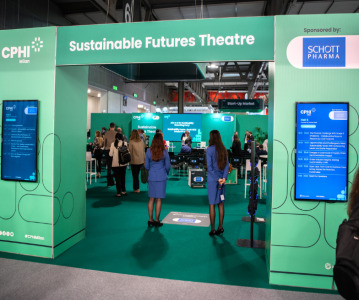The future of liquid pharmaceutical processing on show ... virtually!
.jpg)
Syntegon is currently implementing the application of Artificial Intelligence in visual inspection in several pilot projects together with customers – and will present the approach at the Virtual Show.
Syntegon to showcase flexible solutions for small and microbatches, new developments for liquid filling and assembly, as well as AI-enhanced product safety.
Next month, Syntegon Technology will provide insight into the future of liquid pharmaceutical processing at Virtual Show (7–13 May).
Using a combination of digital machine presentations, concept studies and pilot projects, Syntegon will demonstrate how pharmaceutical manufacturers can prepare for future trends.
For example, the company's new Flexible Filling Portfolio includes individually configurable, modular machines for processing small and medium batches to accommodate the increasing demand for new, targeted drugs for small patient groups.
Klaus Ullherr, senior product manager at Syntegon, explains: "The modular approach bundles our entire line competence for liquid pharmaceuticals and offers our customers maximum flexibility."
Whether syringes, vials or cartridges, pharmaceutical manufacturers can select the different modules individually and obtain a filling line completely tailored to their needs, including an integrated isolator for aseptic and high-potent active ingredients.
For even smaller batches, Syntegon will present a concept study for the processing of aseptic and high-potent micro-batches. "For very small batches, the focus is not on output, but on loss-free filling and fast batch changes," explains Ullherr. "The biggest challenge was to design the isolator of the production cell without glove ports." The result is a highly flexible and fully automated production cell with the smallest possible dimensions and a complete batch-to-batch changeover within 2 hours.
Another premiere at the Virtual Show will be the new version of the FLK 9000 piston filling machine — a monobloc solution consisting of the linear FLK filling and the rotary VRM capping machine for liquid pharmaceutical and cosmetic filling. The machine ensures the bottles are continuously filled, before being capped, which significantly shortens the length of the line. Furthermore, the filling tubes are moved automatically to the cleaning position and improved accessibility to the filling tubes makes format changes easier.
Syntegon will also demonstrate how new software that generates valuable data can be used for traceability and increased product safety.
"Until now, object-specific data could not be assigned to individual batches or containers once they left the machine," Markus Heinz, product manager at Syntegon, explained. The company's new Single Object Data Acquisition (SODA) system provides a remedy: a data matrix code attached to the container or closure contains all object-related and process-specific data of the container and can be read with a scanner. Valuable information collected during production can, therefore, now be assigned to individual containers and traced, thereby increasing product safety.
Combined with the Smart Containers from primary packaging manufacturer SCHOTT, the SODA system offers an advantage: the primary packaging materials are initially provided with a unique data matrix code to ensure traceability throughout the entire manufacturing process. The codes are scanned by cameras that can be used to equip and retrofit filling and closing machines as well as upstream and downstream equipment. The recorded information can be retrieved and analysed for each individual container at any time.
The use of Artificial Intelligence (AI) in visual inspection is a demanding step in the pharmaceutical manufacturing process. Many industry branches already use the required software solutions and algorithms. Manufacturers of automated visual inspection machines, therefore, need only to make minor adjustments to existing software solutions. More importantly, however, is the know-how in software implementation and process validation. The deep learning model in pharmaceutical use must be statically fixed after the development phase and is not allowed to change to meet the corresponding validation requirements. Syntegon is currently demonstrating how this can be achieved in several pilot projects together with customers and at the Virtual Show.

Related News
-
News Pfizer may shift production back to US under Trump pharma tariffs
At the 45th TD Cowen annual healthcare conference in Boston, USA, Pfizer CEO Albert Bourla outlined the potential for Pfizer to shift its overseas drug manufacturing back to the US as pharmaceutical industry players weigh their options against Presiden... -
News Women in Pharma: Connecting accessible pharma packaging to patients – a Pharmapack Special
Throughout our Women in Pharma series, we aim to highlight how CPHI events encourage discussions around diversity, equity, and inclusion initiatives in the pharmaceutical industry. -
News CPHI Podcast Series: Packaging expert perspectives at Pharmapack 2025
This month's podcast episode sounds a little different, covering the latest event in Paris – Pharmapack 2025. Digital Editor Lucy Chard speaks to several experts direct from the floor of the show, bringing you right in on the action.&nbs... -
News Closing 2024 with Editors' picks of top articles from the past year
Coming to the end of 2024 and it’s certainly been a busy year, for CPHI and for the rest of the pharmaceutical and healthcare industry. Topics of conversation throughout the last 12 months have been varied, touching on the technical, to the polit... -
News SCHOTT Pharma’s sustainable journey with CPHI
Sustainability is of paramount importance in the pharmaceutical industry. See how a recent partnership between CPHI and SCHOTT Pharma has helped to highlight and accelerate their sustainability journey to reach global goals. -
News CPHI Podcast Series: Investing in a vision for the future of life sciences
In this episode Lucy Chard is joined by Rajiv Khatau to discuss the importance of looking into new therapeutic areas and some of the more niche areas of pharmaceuticals, and investing in the future of the industry. -
News Lessons from CPHI Milan 2024: Sunny Intervals for Pharma Manufacturing?
As the 2024 CPHI conference wrapped up in Milan, we caught up with L.E.K. Consulting – a global strategy consulting firm with deep expertise in pharma manufacturing – to discuss evolving market perspectives and business outlook. -
News Women in Pharma: Reflections from Behind the Scenes
In this instalment of our monthly series, the team that brings you the Women in Pharma series each month sits down for a heart-to-heart on what the series means to them, and how they hope to continue their work in the future.
Recently Visited
Position your company at the heart of the global Pharma industry with a CPHI Online membership
-
Your products and solutions visible to thousands of visitors within the largest Pharma marketplace
-
Generate high-quality, engaged leads for your business, all year round
-
Promote your business as the industry’s thought-leader by hosting your reports, brochures and videos within your profile
-
Your company’s profile boosted at all participating CPHI events
-
An easy-to-use platform with a detailed dashboard showing your leads and performance







